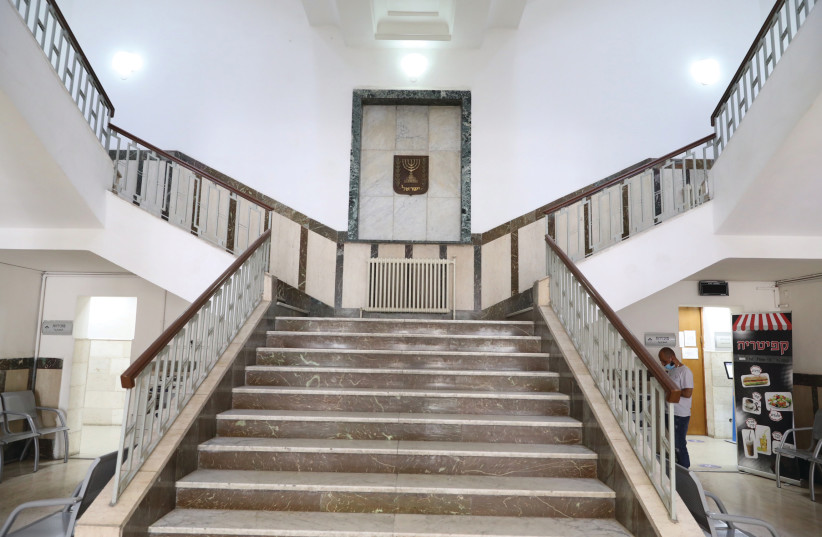 Netanyahu’s historic trial is finally here
Netanyahu’s historic trial is finally here
YAAKOV KATZ
Editor’s Notes: There are many problems with having someone on trial while at the same time serving as prime minister.

It is one of those historic events that you’ve known is coming, but until it starts, it’s hard to believe that we are actually here.
The “event” in this case is the criminal trial that will open on Sunday against Prime Minister Benjamin Netanyahu, marking a historic low for Israel: a sitting prime minister standing trial on charges of bribery, fraud and breach of trust.
Throughout the years of the Netanyahu investigations, there were countless predictions that Israel would never reach this point. “The coalition won’t let him stay in power,” some analysts predicted; others said that the top Likud ministers would eventually send him home.
But the investigation carried on.
First the police recommended he be indicted, and then came the indictment; only one Likudnik challenged him outright, and he lost; and even as some in the media and the Knesset called on Netanyahu to step down, he was defiant.
Not only did the prime minister stay in power; he maneuvered his rival – Blue and White leader Benny Gantz – to agree to sit under him in a coalition as his defense minister.
There are many problems with having someone on trial while at the same time serving as prime minister, the most visible political representative of every country. There is, for example, the impact it will have on the country’s moral fabric: is this the political role model to look up to for the younger generation – or any generation? An indicted leader who will now need to sling mud to survive? Is there no shame anymore? Does political survival come before anything else?
Another problem: it will be impossible to know anymore what is sincere and what isn’t. Let’s say there is another Tehran cyberattack against Israel – there appeared to be one on Thursday, and a possible earlier attack two weeks ago – and Netanyahu decides to retaliate with an all-out aerial assault against Iran’s nuclear facilities. Will Israel strike because that is genuinely what is needed, or because the prime minister wants to divert attention away from his trial?
What about the coronavirus? If and when the much-expected “second wave” of the coronavirus arrives, and Netanyahu decides to impose tough draconian restrictions on civilian life including the closure of courts – is he doing it because that is what’s needed? Or because it helps his case to delay it? These scenarios are not hypothetical. They can happen as early as Sunday afternoon, just after his first appearance in the Jerusalem courtroom.
Every decision will be suspect, every move will be suspicious. The division in this country will only grow between the camp that trusts Netanyahu and the sincerity of his decisions, and the camp that does not. Little good will come of this.
And then there is the third problem: the war he and the Likud are waging against the judicial system that has the potential to forever alter the rule of law here. This does not mean that Netanyahu will soon raze the courts – but that is only because he doesn’t have to. Not every revolution happens in a single day. In some cases, it is a slow but systematic process that focuses first on changing public opinion.
For example: just a few weeks ago, former Knesset speaker Yuli Edelstein blatantly ignored a High Court ruling. Did the people rise up? No. The reason is because Netanyahu and the Right’s campaign against the Supreme Court has been effective in getting the public to lose trust in the country’s most important judges. According to one recent poll, only about half the country trusts the courts.
When all they hear from the Likud is the “Court is drunk on power” (Gideon Sa’ar), “I won’t let the court intervene” (Yariv Levin), or “Not every ruling needs to be obeyed” (Amir Ohana), there will be a lasting effect.
Add to this the direct attacks on the attorney-general, the police and the prosecution, and you get the picture: a targeted campaign to delegitimize the judicial system by portraying the case against Netanyahu as personal and unjustified.
When Netanyahu’s attorneys filed a request on Tuesday that the prime minister be exempt from attending the opening hearing on Sunday, they claimed that bringing him to court would incur exorbitant costs for security. Basically, the lawyers argued, the prime minister is only trying to save money for the taxpayer.
The problem was that not only was the argument ridiculous – the prime minister goes almost anywhere he wants including crowded places like open marketplaces and malls – but also cynical. It came just two days after Netanyahu swore in his new government of 34 ministers – some for made-up ministries – and 16 deputy ministers. This cost the country hundreds of millions of shekels – and suddenly he cares about the security costs for his court appearance?
The request was really only submitted so that when it was rejected, the lawyers could issue their response: “There is no alternative but to conclude that the prosecution’s decision is a continuation of the ‘Just not Bibi’ campaign,” his lawyers said.
In other words, this decision, as well as the entire legal process against Netanyahu, is nothing more than a ploy by the deep state and the media to overthrow the prime minister. That is the message that will continue echoing over the next few years of this legal process. It will have nothing to do with the legal arguments being brought before the court or the charges against him; everything will be about delegitimizing the court, in front of the only court that really matters to Netanyahu: public opinion.
All of this has the potential to cause Israel irreparable damage. When the courts are systematically undermined and the rule of law disintegrates, who will be there to stop it? Who will prevent anarchy from breaking out? This revolution won’t happen in one day. It has the potential to creep up on us, but when we finally see it, it might be too late.
This does not mean that the courts are perfect. Far from it. They make mistakes, they intervene in cases that they shouldn’t. But a suspect in a crime, indicted and standing trial, cannot oversee judicial reforms at the same time as he is fighting to prove his innocence. Is there no greater conflict of interest?
***
FIFTY-THREE YEARS AGO today, the IDF liberated Jerusalem. It was the third day of the Six Day War, a war that ended with Israel also in possession of the West Bank/Judea and Samaria, the Gaza Strip, the Golan Heights and the Sinai Peninsula.
Earlier this week, I looked back at The Jerusalem Post’s coverage of the war. It is always interesting to see how this paper was laid out back then, what stories were highlighted on the front page. On the third day of the war, June 7, the headline read: “Scopus Road Opened, Old City Encircled.” IDF paratroopers would reach the Western Wall later that day, and Israelis would hear the famous words: “Har Habayit Beyadeinu,” the Temple Mount is in our hands.

What struck me about the page though was a 2” x 2” ad that appeared at the bottom, placed there by Moshe Dayan, the defense minister in the midst of becoming an Israeli war hero. “I would like to thank all of those who have expressed their good wishes on my appointment as Minister of Defence,” Dayan wrote, adding: “I would ask my friends to forgive me for not being able to reply to each one personally in view of the needs of the hour.”
Think about that: Israel was in the middle of a historic war that would change the country and the Jewish people forever – and the defense minister puts an ad in the paper apologizing to his friends that he cannot reply to their good wishes? Amazing.
As I moved on to June 8, the next day’s paper that reported on the liberation of Jerusalem, I saw a beautiful column headlined “Sixty Hours” appearing on the front page. It did not have a byline, and served as that day’s editorial.
“Let no one think that Zahal’s [the IDF’s] fantastic array of simultaneous victories is due to luck or chance, the poor training and morale of the Egyptians or even the profound consciousness of every soldier that he is fighting quite literally for his own survival and for that of his family and people.
Their training and planning started with the watchmen of the “Shomer” – one of whose earliest theorists was Mr. Ben-Gurion – and it was continued in the difficult underground days of the Haganah, when defence against Arab hostility had to be prepared in secret for fear that British policemen would confiscate the small store of precious weapons.
“The result is an army with all of the best qualities of the civilians of whom it is made up, fortified by devotion, loyalty and unity. They have proved victorious every time against armies whose officers were trained at some of the best European and American academies. The army was born out of need, not pride, and shaped by adversity, not privilege. Its face is the face of Israel, and the success of its youthful legions has marked the nation in gratitude, pride and a deep affection.”
Yom Yerushalyim Sameach! Happy Jerusalem Day!
Zawartość publikowanych artykułów i materiałów nie reprezentuje poglądów ani opinii Reunion’68,
ani też webmastera Blogu Reunion’68, chyba ze jest to wyraźnie zaznaczone.
Twoje uwagi, linki, własne artykuły lub wiadomości prześlij na adres:
webmaster@reunion68.com
